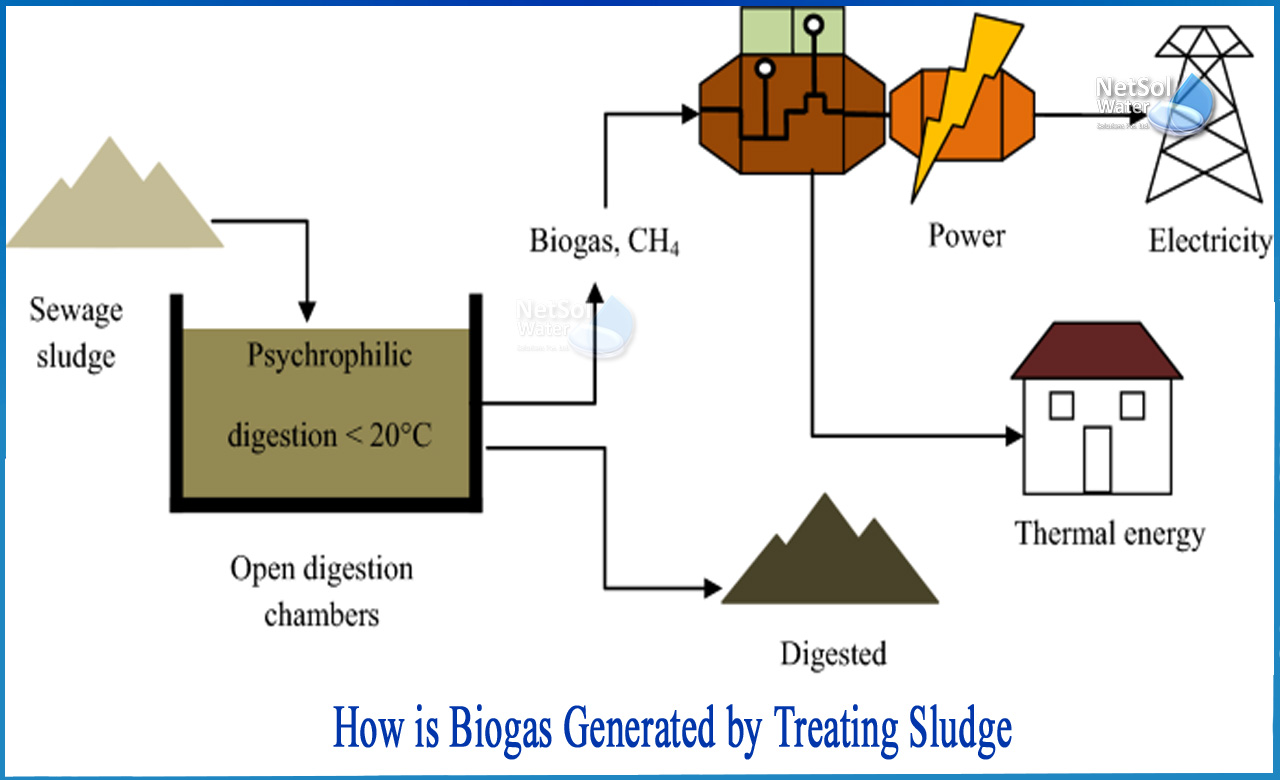What is biogas?
Biogas is a type of biofuel that is naturally produced from the decomposition of organic waste. When organic matter such as food and animal excrement is decomposed in an anaerobic environment (without oxygen), a mixture of gas, methane and carbon dioxide is released.
How is biogas generated by treating sludge?
Biogas is a mixture of methane, carbon dioxide, and small amounts of other gases. This compound can be successfully used as a renewable energy source. Biogas is a by-product of anaerobic digestion from biomass (organic matter). Because biogas is produced from natural processes that take place in a closed environment, its composition can be difficult to control. Therefore, the ratio of methane to carbon dioxide can change. The most common ratios are 60% CH4 (methane) and 40% CO2 (carbon dioxide), but biogas is assumed to contain 45-75% methane and 55-25% carbon dioxide.
Like all other energy sources, the production and use of biogas has its strengths and weaknesses. These practical aspects need to be carefully considered when analysing investments in biogas plants.
The most common benefits of biogas are:
1. It is a renewable and clean energy source based on a climate-neutral process.When using biogas, no new amount of carbon is released into the atmosphere.
2. Helps divert food waste from landfills and has a positive impact on the environment and economy.
3. Reduces soil and water pollution from animal manure and human faeces, ensuring a healthy and safe environment for many communities around the world.
4. Reduces the amount of CH4 (methane) released into the atmosphere, counters climate change and has the potential to have an immediate impact on the environment.
The disadvantages of using biogas as an energy source include:
1. Biogas production is dependent on biological processes and cannot be completely controlled.
2. It works more effectively in warm climates. This means that biogas is not immediately accessible around the world.
What kind of waste can be used to produce biogas?
All organic waste can be used to produce biogas. You can use raw materials such as agricultural waste, urban waste, plant materials, fertilizers, human faeces, sewage, garden (green) waste and food waste.
Is biogas good or bad?
Biogas is an excellent source of clean energy and is less polluting than fossil fuels. Biogas does not affect the ecosystem but is climate neutral. This is because biogas was previously made from plant materials that combined carbon from carbon dioxide in the atmosphere. The balance between the amount of carbon released from biogas and the amount absorbed from the atmosphere is maintained.
How is biogas produced?
Anaerobic digestion (AD) is the most widely used method of sludge stabilization. AD biologically stabilizes sludge in the absence of air. By converting volatile solids into biogas (methane CH4, carbon dioxide CO2, water H2O), the proportion of volatile solids is reduced. The biogas then needs further treatment to recover and reuse the methane content. The stabilized solids can be used for soil conditioning in the same way as the solids produced during the addition of lime.
The AD can be operated with one of the following:
-At medium or mesophilic temperatures (optimal range of 30-39 ° C), or at high temperature (or thermophilic) (49-57 °C).
-The exact optimum temperature within these ranges depends on the desired results in terms of biogas production and composition, solids reduction and energy efficiency.
-Operation below to 20°C is called psychrophilic. Operating at such low temperatures can be more energy efficient. However, the biochemical reaction rate and the corresponding biogas production rate decrease at lower temperatures, so the required tank size increases accordingly.
As with most sewage sludge and wastewater purification processes, the design and performance of AD depends on the characteristics of the feed. In urban sewage treatment, AD is most used to treat solid, primary, and secondary (waste activation) sludge streams derived from the activated sludge process .The characteristics of the stream generated from the AD process (that is, biogas and stabilized solid products), and the operation of the plant are affected by the quality of the feed sludge.
Because anaerobic digestion is a biological process, it can be affected by high concentrations of toxic or potentially toxic substances, especially sulphates and heavy metals.
i) Energy consumption is much lower than aerobic digestion / stabilization,
ii) Less waste and at the same time use less chemicals than alkali stabilization, but anaerobic digestion is an alternative. It is more expensive and more complex to operate than the stabilization option.
iii) Recommended in large areas where the operational costs of the alternative process are important.
Conclusion
Netsol Water is a company which specialises in offering integrated design, fabrication, installation, and maintenance services. We are one of the most dependable waste management solution providers. Customers tell us about the advantages of Netsol's complete water management systems. Years of experience and skill are inextricably linked to Netsol's equipment solutions, testing and monitoring, analysis, and suggested corrective actions.
Netsol Water is Greater Noida-based leading water & wastewater treatment plant manufacturer. We are industry's most demanding company based on client review and work quality. We are known as best commercial RO plant manufacturers, industrial RO plant manufacturer, sewage treatment plant manufacturer, Water Softener Plant Manufacturers and effluent treatment plant manufacturers. Apart from this 24x7 customer support is our USP. Call on +91-9650608473, or write us at enquiry@netsolwater.com for any support, inquiry or product-purchase related query.



